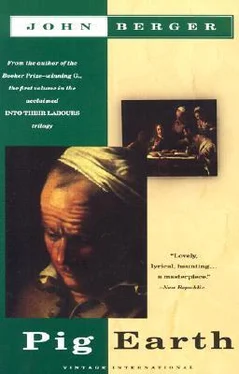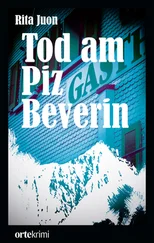Hold the tree, I said.
She couldn’t reach it.
I’ll sit on your shoulders, she said.
The onlookers below started to cheer. All the remembered dead of the village were there, women and children as well as men. She held the tree and I drove in four nails.
The little tree pointed up into the sky. She sat behind me, her arms relaxed. We were like a couple riding on their horse going to work in the fields. Her hands lay in my lap.
The bandsmen raised the instruments to their mouths, the drummers lifted their sticks. For a moment they remained transfixed and still, then they started to play.
The sign of the tree nailed to the roof was in honour of a work completed. All that remained to be done was to cover the roof with bûchilles cut from the beams, to lay the floors, nail boards on the walls, make and fit the doors and windows, construct the chimney, build the cupboards, make the shelf for the bed. It was the work of months. Yet the whole weight-bearing frame which promised shelter was there.
How can I tell you what the band played. I could hum the melody and you would not hear it. The bandsmen were dead and they played the music of silence. On Ascension Day the village band goes out into the country across the slopes, between the orchards, and, wherever there are two or three farms, it stops to play. Three summers I went out with them as drummer before I had to leave to find work. The music drowns the noise of the water in the bassin , it drowns the streams, it drowns the cuckoo. At each farm they gave us cider or gnôle to drink. The saxophonist, who played like a bird, always got drunk. Sweating under our peaked caps and in our brass-buttoned jackets we played as well and as loudly as we knew how, and the louder we played, the more still became the mountains and the trees of the forest. Only the deaf butterflies continued to flutter and climb, close and open their wings. On Ascension Day we played to the dead, and the dead, behind the motionless mountains and the still trees, listened to us. Now everything was the other way round, it was the dead who played at the foot of the chalet, and I, astride the roof, who was listening.
The village began to dance to the music, on the grass under the roof timbers. The Cocadrille beat her hands on my thighs to the rhythm of the music. I saw that my blood had not turned as cold with age as I thought it had. When the music stopped she kept her hands there.
The band started up again.
Wait for me, she whispered.
Climbing to her feet, she walked along the ridge of the roof like a chamois. As she went down I prided myself on having learnt from experience. Her return would be startling and unexpected. Still aroused, I tried to foresee how she would come back: perhaps she would come back aged twenty and naked as though she had been bathing in a river.
It was impossible to make out the uniforms of the bandsmen. Occasionally an instrument glinted like an ember when you blow on it. They knew the dances they were playing by heart, for it was too dark to read the notes on the music cards clipped to their instruments. The dancers, as the light disappeared, packed closer and closer together into the chalet.
I peered down, looking for the Cocadrille. The darkness was not so total that the whiteness of her body would not give off a certain light, like the white flowers sewn on to the tree did.
I felt my way down the first ladder. The dancers were now packed together in the area which would be the stable, where we would milk the cows. The cows were there. One was licking the head of her neighbour. Her tongue was so strong that when she licked round the eye, it pulled it open, revealing the eyeball, as you must do if you are looking for something which has entered the eye and is hurting it.
Seeing that eye, I saw the truth. The Cocadrille was not going to come back. Or if she came back, she would come back as nothing.
Lucie! Lucie!
Beyond the timbers of the roof the stars were shining. They shine over some oceans like they shine over the alpage. They are very bright and the similarity isn’t in their brightness; it is simply that their distance isn’t confusing. The Milky Way was folded into the sky like the ranunculi bordering the stream are folded into the hill beside the abandoned Cabrol chalet.
I missed my footing, rolled, like a log, down a precipitous slope. What saved me were some rhododendron bushes at which I instinctively, unthinkingly, grasped. I never lost consciousness. Ten metres further down was a sheer drop of a hundred metres. I had a broken arm and shoulder. When it was light, I somehow made my way down the path where the cumin grows, my arm hanging loose like the tongue of a bell.
Ten days later I met ’Mile à Lapraz in the village.
Where were you, ’Mile, ten days ago?
At home.
Where exactly, doing what?
The Friday, you mean?
Yes, the Friday.
Wait, Friday. I remember, I was ill in bed. I had terrible pains in the stomach. A white weasel was eating it. I swear to you I thought it was the end. As it turned out, he didn’t want me, and so here I am. I’ll pay you a drink.
Standing by the counter of the café, he clinked glasses and said conspiratorially: To the two of us they didn’t take!
Later when my arm was still in plaster, I walked up to the roadmender’s house. The weight of the plaster round my arm was as heavy as iron. I climbed slowly, letting one leg follow the other: the body becomes accustomed to a rhythm not unlike that of a cradle being slowly rocked from side to side. After an hour or two of such climbing you promise yourself a pleasure: the pleasure at night of lying absolutely still.
The hospital had discovered nothing with X-rays, yet I was convinced that at least one of my ribs was fractured. With each breath it stabbed me on the left-hand side, near the heart. I stopped once and looked down at the valley and the road that led away. I remembered the Cocadrille’s story of the curé climbing up to the house and being taken ill. What was it that he muttered when she loosened his clothes on the table?
I had not been to the Cocadrille’s house since the night when she came down from the loft wearing her wedding veil. The chicken hutches had been taken away from the ledge, and the door was ajar. I knocked. I could hear only the Jalent below. I pushed the door open. The table and chair were still there. There was nothing on the mantelpiece. Who had taken the plates? I opened the stove. It was stuffed with the recent remains of a picnic. On the wall by the cupboard some initials had been scratched, neither hers nor mine, and beside them was a drawn heart, the shape of an owl’s face, with an arrow through it.
In the stable I found some sacks and the bear’s paw. There was no sign of the blue umbrella. I climbed up the ladder to the loft. She dreamt about that ladder. She was in her bed in the loft and a young man climbed up and started to undress to get into bed with her. She could see that he was beautiful. He slipped between the blankets beside her and just as she felt his warmth, she woke up. The bed too had gone.
Before I was six, before I looked after the cows, perhaps I was only two or three, I used to watch my father in the kitchen on winter mornings, when it was still as dark as night. He knelt by an iron beast, feeding it. If I came near, he shouted at me. He knelt down at one side of the animal, between its iron legs and, breathing deeply, he whispered to it. I saw my father praying in church. In the kitchen he prayed in long breaths, blowing and sighing. I never saw the iron animal’s face, which was inside its stomach. After a while I could feel the warmth filling the kitchen, and my father would sit beside the animal, warming his feet between its legs, before putting his boots on and going to feed the other animals. Now when I light the stove in the morning, I say to myself: I and the fire are the only living things in this house; my father, mother, brothers, the horse, cows, rabbits, chickens, all have gone. And the Cocadrille is dead.
Читать дальше












